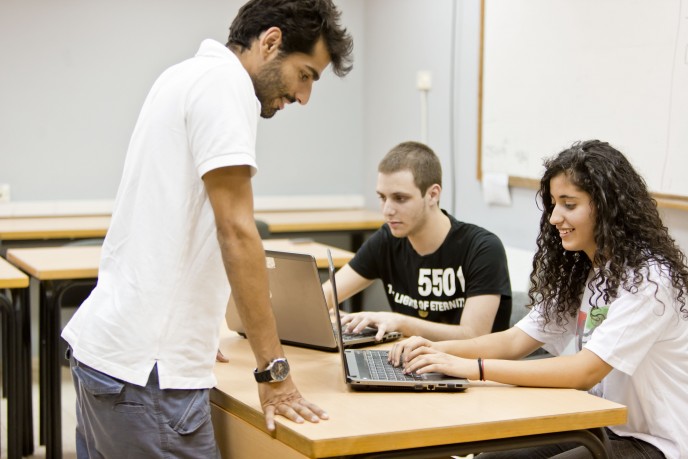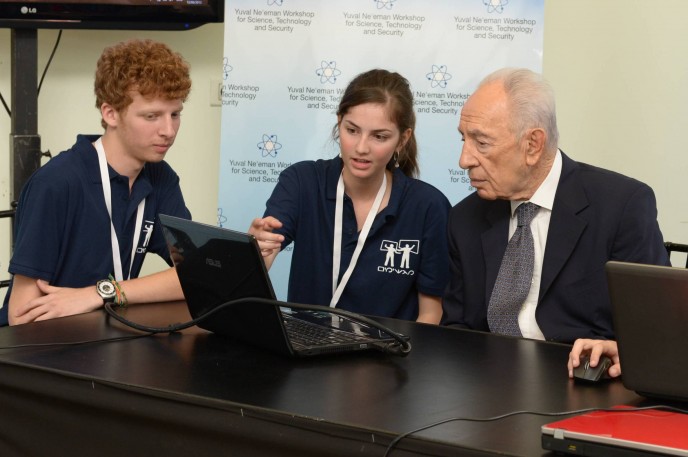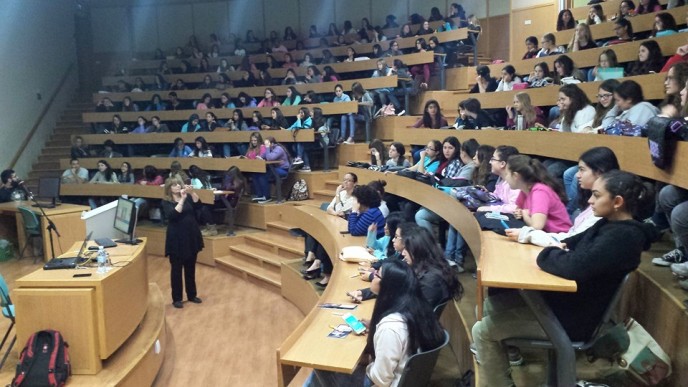
The arid Negev Desert bloomed into farmland with the help of advanced agro-tech. The parched Negev economy can bloom with the help of advanced cyber-tech, say the founders of an initiative to identify and train gifted middle- and high-school students in the underserved geographic and social periphery of Israel.
The short-term goal of Magshimim is to boost the pool of periphery-area candidates for military intelligence units, which are stepping stones to high-tech careers. The long-term goal is to create future business and academic leaders in places remote from Israel’s startup ecosystem.
Magshimim (a Hebrew word for those who fulfill a dream) was launched five years ago in Beersheva, the unofficial capital of the Negev and the up-and-coming capital of cyber-tech innovation. The military plans to relocate its technological units to the Negev from central Israel; the CyberSpark national cyber complex was launched in Beersheva in January last year; and multinational companies are opening cyber R&D labs here.
One Magshimim instructor, Shlomi Boutnaru, 29, cofounded the Beersheva cybersecurity company CyActive, recently acquired by PayPal. PayPal is now building its worldwide cyber R&D center in Beersheva.
All of this translates to tens of thousands of employment opportunities for engineers and scientists.
“If the implementation isn’t handled correctly, these workers would come from the center of the country and there would be no positive impact on residents of the South,” says Itzik Turgeman, director general of the Rashi Foundation, which founded Magshimim with the Defense Ministry.
Smart enough to be cyber engineers
Several Rashi programs promote science and technology to give kids from Negev towns such as Beersheva, Dimona and Yerucham equal or better footing with more privileged peers.
For example, Horizon to High-Tech helps talented young periphery residents gain an engineering or science degree even if they don’t meet college admissions criteria or cannot afford higher education.

Magshimim’s focus on cyber training recognizes both the urgent need for skilled technologists and the suitability of the Negev as an employment hub.
“This is one of the fastest-growing fields in high-tech, and it does not need heavy investment in infrastructure,” Turgeman tells ISRAEL21c. “You just need a computer, Internet access and a smart person. You can do it in Dimona as easily as in Herzliya.”
Students chosen through a rigorous selection process (only one out of three applicants is accepted) receive a laptop and attend two weekly three-hour sessions over the course of three years.
Magshimim is currently offered in 14 locations and includes team-building activities, social enrichment, community service, tours of high-tech companies and summer cyber camp.
Turgeman, former head of the Defense Ministry’s Society and Security Division, previously founded Atidim, which identifies promising students from disadvantaged towns and accompanies them through their studies in the academic elite force.
“When I started Atidim 15 years ago, people said you cannot bring potential from the periphery. Today Atidim’s academic reserve supplies around 40-50% of the engineers and scientists in the IDF. If they’re smart enough to be engineers and scientists, why not cyber engineers?” says Turgeman.
After a successful pilot, Magshimim expanded to peripheral communities nationwide, with additional support from the Ministry of Education, prime minister’s office, Israel National Cyber Bureau, National Lottery Fund, Adelis Foundation, Schulich Foundation and Keren Daniel, as well as partner businesses.
Southern startups
Last year, 18 Magshimim graduates placed in the top 50 of the IDF cyber unit, and Turgeman hopes that eventually half the army’s cyber trainees will come from Magshimim.
“But this is only a tool toward our mission of creating leaders for existing and startup cyber industries in the periphery so people won’t need to move to Tel Aviv to find high-level work,” he says.
The current goal is to graduate 900 kids per year.
“We must create a critical mass,” Turgeman says. “If you qualify one here and one there, there will be no big change. If you qualify hundreds of cyber experts, you’ll see tens of new startups in the south every year.”
This year saw the launch of Nitzanei Magshimim for middle-school students identified as promising candidates for Magshimim. The total number of students in both programs is expected to reach 4,800 within five years, with increased emphasis on enrolling girls, kids with physical disabilities, and Druze, Ethiopian and ultra-Orthodox Israelis.
Ilana, 16, of Ashdod, tells ISRAEL21c that she never verbalized her interest in computers until Magshimim did a presentation to her ninth-grade class. This was the opportunity she’d been waiting for. She’s one of four girls in her Magshimim class of 16, and participates in girls-only Magshimim support meetings.
“Girls should try to be connected in the computer world because once you’re in it you feel you can improve the world,” says Ilana. “I definitely want to contribute to the country in what I can do best.”
Tal, 18, of Meitar, is finishing his third year in Magshimim and is trying out for a top IDF intelligence course. “I am almost sure it would be completely impossible without Magshimim,” he tells ISRAEL21c.
“This may sound geeky, but I didn’t realize before how exciting cyber-tech could be. I wanted to pursue a career in biology but the more I learn and experience [cyber], the more I want to do this in the future. I like knowing I can build new things and improve the lives of others and myself.”
Turgeman aims to have Magshimim students comprise half of the most prestigious army cyber-training course.
For more information, click here.















